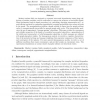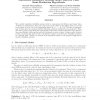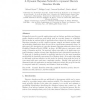365 search results - page 38 / 73 » Semi-automatic derivation of timing models for WCET analysis |
101
click to vote
TSP
2008
14 years 11 months ago
2008
Markov random fields are designed to represent structured dependencies among large collections of random variables, and are well-suited to capture the structure of real-world sign...
TR
2011
14 years 6 months ago
2011
We consider repairable reliability systems with m components, the lifetimes and repair times of which are independent. The l-th component can be either in the failure state 0 or i...
107
click to vote
WSC
1997
15 years 1 months ago
1997
We present a system for describing and solving closed queuing network models of the memory access performance of NUMA architectures. The system consists of a model description lan...
IJON
2010
14 years 10 months ago
2010
Originally devoted to specific applications such as biology, medicine and demography, duration models are now widely used in economy, finance or reliability. Recent works in var...
108
click to vote
INFOCOM
2005
IEEE
15 years 5 months ago
2005
IEEE
Abstract— Motivated by applications to sensor, peer-topeer and ad hoc networks, we study distributed asynchronous algorithms, also known as gossip algorithms, for computation and...



